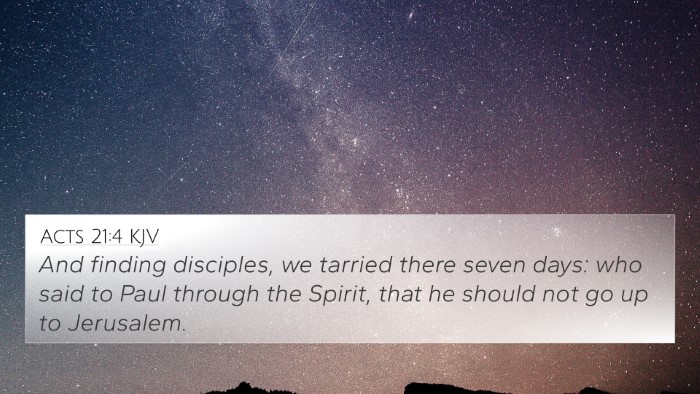Understanding Acts 10:19: Insights and Commentary
Acts 10:19 presents a significant moment in the early Christian church, conveying themes of divine revelation and the breaking down of barriers between Jews and Gentiles. This verse reads:
"While Peter thought on the vision, the Spirit said unto him, Behold, three men seek thee."
Verse Analysis
This verse occurs within the context of Peter's vision regarding clean and unclean animals, symbolizing the gospel's extension beyond the Jewish community to all people. Below are insights from notable public domain commentaries:
- Matthew Henry: Henry emphasizes that Peter's deep contemplation was necessary for understanding God's message. The three men symbolize those Gentiles seeking God, proclaiming the inclusive nature of the Gospel.
- Albert Barnes: Barnes notes that the Spirit's intervention is pivotal, indicating divine guidance in Peter's mission. It illustrates the prophetic nature of divine plans and aligns with God's intention to integrate Gentiles into the faith.
- Adam Clarke: Clarke highlights the significance of the number three, possibly symbolizing completeness or the Trinity. He also points out the urgency in the Spirit's message, prompting Peter to act swiftly in response to the call.
Thematic Connections
Acts 10:19 serves as a linchpin for several larger themes within the New Testament. Here are some relevant connections and thematic Bible verse relations:
- The Divine Initiative: God takes the first step in reaching out to humanity, as seen in John 15:16, where Jesus states, "Ye have not chosen me, but I have chosen you."
- Breaking Down Barriers: Ephesians 2:14 illustrates Christ as our peace, who has broken down the dividing wall of hostility between Jews and Gentiles.
- The Call to Mission: Matthew 28:19-20, commonly known as the Great Commission, establishes the mandate to spread the Gospel to all nations.
Key Cross-References
Acts 10:19 connects with numerous other scriptures, providing a fuller understanding of its themes. Here are 10 Bible verse cross-references:
- John 10:16 - "And other sheep I have, which are not of this fold: them also I must bring." - Indicates inclusivity in Christ's mission.
- Acts 11:17 - Peter reflects on how God granted the same gift to Gentiles, showcasing God’s impartiality.
- Romans 1:16 - "For I am not ashamed of the gospel of Christ: for it is the power of God unto salvation to every one that believeth; to the Jew first, and also to the Greek." - Affirms the Gospel's reach.
- Galatians 3:28 - "There is neither Jew nor Greek, neither bond nor free, there is neither male nor female: for ye are all one in Christ Jesus." - Highlights unity in diversity.
- 1 Peter 2:9 - Describes believers as a chosen generation, implying a communal status irrespective of ethnic background.
- John 20:21 - Jesus sends His disciples as the Father sent Him, reinforcing the missional aspect.
- Revelation 7:9 - A vision of a great multitude from every nation, exemplifying the culmination of God’s plan for all races.
- Isaiah 49:6 - "It is too small a thing for you to be my servant to restore the tribes of Jacob and bring back those of Israel I have kept. I will also make you a light for the Gentiles, that my salvation may reach to the ends of the earth." - Prophecy about the inclusion of Gentiles.
- Luke 24:47 - Jesus says that repentance for the forgiveness of sins will be preached in His name to all nations, underlining the universality of His message.
- Acts 1:8 - Jesus commands His disciples to witness in Jerusalem, all Judea, Samaria, and to the ends of the earth, hinting at the geographical and cultural expanse of the Gospel.
Importance of Cross-Referencing
Finding connections between Bible verses is crucial for a deeper understanding of scripture. By engaging in cross-referencing Biblical texts, believers can:
- Identify overarching themes and messages that span both the Old and New Testaments.
- Gain insight into God's continuous revelation through His Word.
- Develop a comprehensive understanding of scriptural contexts and their applications in modern faith.
Tools for Bible Cross-Referencing
To effectively study the Bible's interconnections, various resources can be utilized, such as:
- Bible Concordances: Useful for finding specific verses and related themes.
- Bible Cross-Reference Guides: Provide lists of related scriptures for thematic studies.
- Digital Bible Study Tools: Many software tools allow for easy linking of scripture and comparative analysis.
- Commentaries and Scholarly Texts: Provide context and interpretation, enriching the study process.
Conclusion: Embracing Inter-Biblical Dialogue
Acts 10:19 serves not only as a transformative moment for Peter but also as a foundational passage for understanding the expansion of the Christian message. By engaging in comparative Bible verse analysis and leveraging tools for cross-referencing, believers can deepen their insights into the connections that bind the scripture together, recognizing the enduring relevance of God's Word in all contexts.










